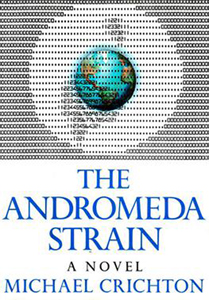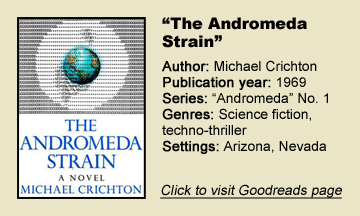Here’s where it all begins. Although Michael Crichton had written some novels under other names, “The Andromeda Strain” (1969) is when the world got to know him as a cool and collected research-oriented hard SF writer. This taut techno-thriller codifies Crichton’s mixture of fictional tale with hard science.
When Crichton presents the story of the race to stop a horrific pandemic as if it was a real event, it makes me think of “Fargo’s” fake “This is a true story.”
An engrossing ‘report’
“The Andromeda Strain” came out two months before the first moon landing, and I’m guessing the idea of a virus from space was at least in the back of people’s minds throughout the 1970s NASA missions.
The book features 1969 computer technology, but I got into the spirit of it, poring over the graphics and charts, looking for clues. Crichton would later integrate graphics and charts better. Here they are more illustrative than they are clue-oriented.
But they do emphasize the data-oriented nature of the mystery that four scientists (Stone, Burton, Leavitt and Hall) are trying to solve at the bottom of a five-level underground government lab in the Nevada desert.
The quartet is armed with the space capsule, the titular strain that’s inside, and the only two survivors of the initial exposure: an old man and a baby.
Foregrounding the background
Crichton does a thing where he gives us a little bit of the intense story, then – springing from a line of dialog or movement into a new section of the facility — gives us background (such as the thought process behind building of a specific lab room) or a scientific explanation (such as the story of a cancer cure that was rejected because it killed good bacteria as well as bad).
The author is like a party guest who draws everyone into his sphere by making complex topics accessible and engaging. But he doesn’t go too far into tangents; he snaps back to the scientists’ time-sensitive search for understanding fast enough that no momentum is lost.
Indeed, this novel is barely over 200 pages, but it’s soaked through with tasty information; a reader gets smarter at the same rate he is entertained.
(That said, Crichton would later maintain this blend of density and momentum in even meatier novels, with “Jurassic Park” of course topping the list. So we have an odd case where “Andromeda” is a masterpiece yet it leaves room for improvement.)
“The Andromeda Strain” is timeless in the sense of being an expertly crafted thriller and in not being too hampered by references to old technology. A printer plays a major role, but that’s simply nostalgic to me.
Young readers might briefly be thrown off by the old tech, but more likely they’ll adjust while also learning about the early days of computers.
Timely in coronavirus age
The novel is also, of course, timely in the coronavirus age. The action’s launching point is harrowing as a small Arizona town is wiped out (with the exception of the baby and old man) by the strain that hitchhikes to Earth from an upper-atmosphere NASA capsule.

Then we get the scientists’ work, which parallels the search for a COVID-19 vaccine. Then there’s also the issue of mutation, which parallels our next phase of coronavirus worry.
Crichton is not known as a character writer, and that’s fair, but he knows how to humanize events: Everything happens through the eyes or ears of a given member of the military-scientific establishment who is not merely a cog, but rather an individual.
But honestly, it often doesn’t matter who is in the POV role: Reaction to seeing a town full of corpses is going to be similar from person to person. The point is that Crichton never uses a dull, dry omniscient narrator.
Chaos hypothesis
Somewhat tapping into chaos theory two decades before “Jurassic Park,” Crichton shows how little things go wrong at the bunker, no matter how well planned-out things are.
On the tech side, substations where Hall is supposed to turn a key in order to stop a self-destruct are under repair, so it’s harder for him to get to a functioning one. And each of the four scientists brings specific human foibles into play. For example, Leavitt has epilepsy and chooses not to tell anyone.
Often, I’m not hyper-aware of whether Stone, Burton, Leavitt or Hall is doing the talking, but it never matters. All the characterization that’s needed is that they are dedicated experts in their fields. This mystery is so engrossing that I’d be annoyed if the author did go off on a character-building tangent.
Perhaps his medical background helps: In “The Andromeda Strain,” Crichton knows what medicine readers need and the proper dosage to administer.


